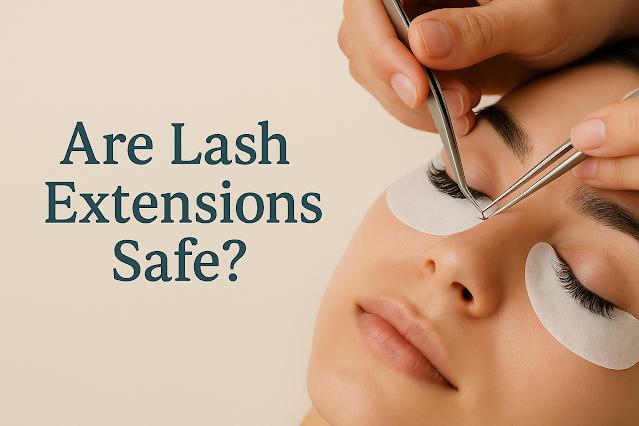Are Lash Extensions Safe? What You Need to Know for Healthy Eyes
Lash extensions are one of today's most popular beauty treatments, providing longer, fuller, and more attractive lashes without the use of mascara. But with beauty comes anxiety, and many people wonder: Are lash extensions dangerous for your eyes?
In this post, we'll look at the hazards and advantages of lash extensions, as well as how to preserve your eye health and professional recommendations for applying them safely.
What Are Lash Extensions?
Lash extensions are semi-permanent fibers—usually synthetic, silk, or mink—that are individually attached to your natural lashes with a specialised adhesive. The objective is to achieve longer, darker, and fuller lashes that will last many weeks with appropriate maintenance.
While the findings are certainly spectacular, it's critical to consider the potential eye health consequences.
Are Lash Extensions Bad for Your Eyes?
The simple answer is: They can be, but not always.
Lash extensions are not intrinsically harmful to your eyes when properly performed by a qualified and registered practitioner. However, incorrect application, dirty instruments, or allergic responses might be dangerous. Let us break it down.
Potential Risks of Lash Extensions
Allergic reactions.
The adhesive used to install lash extensions frequently includes formaldehyde or cyanoacrylate, which can cause allergic reactions and inflammation.
Symptoms may include redness, irritation, swelling, and burning feelings.
Eye Infections
If equipment or lashes are not sterile, they might cause bacterial or fungal infections.
Touching or scratching your eyes regularly raises the risk of infection.
Damage to Natural Lashes
Extensions that are excessively heavy or administered incorrectly might cause lash breakage or premature loss.
Over time, this might result in lash thinning or permanent loss (known as traction alopecia).
Dry Eyes or Sensitivity
The weight of extensions and chemical vapours from adhesives might cause eye dryness or irritation, particularly in persons who wear contact lenses.
How to Make Lash Extensions Safer
If you like the style but are concerned about safety, here are some suggestions to keep your eyes healthy:
Choose a Certified Lash Technician
- Ensure that your lash artist is licensed and works in a clean, respectable salon.
- Before using the glue, enquire about its contents and request a patch test.
Avoid DIY Extensions
- At-home kits or non-professional services raise the possibility of mistakes and infections.
- Never apply extensions without sufficient training.
Follow Aftercare Instructions
- Avoid getting your lashes wet for 24 to 48 hours after treatment.
- Avoid rubbing your eyes or using oil-based makeup removers.
- To eliminate dirt and germs from your lashes, use a light lash cleaner on a daily basis.
Take Lash Breaks
- Allow your natural lashes time to heal between sets.
- Consider using wispy lash strips or individual lashes for a momentary effect with minimal danger.
When to Avoid Lash Extensions
You might wish to avoid extensions entirely if:
- Have you ever had eye allergies or sensitive skin?
- Have blepharitis, conjunctivitis, or another eye ailment.
- Are undergoing therapies that influence hair growth or immunological response (such as chemotherapy).
Safer Alternatives to Lash Extensions
If you're worried about extensions and yet want the lash appearance, consider:
- Wispy lash strips are temporary, reusable lashes that are put above the lash line using adhesive.
- Magnetic lashes don't require adhesive, which reduces chemical exposure.
- Lash serums help strengthen and extend your natural lashes over time.
- Mascara with fibres: A safer, washable alternative that simulates the appearance of extensions.
So, are eyelash extensions unhealthy for your eyes? They don't need to be. When done and maintained correctly, lash extensions may be a stunning and low-risk improvement. But it is critical to be knowledgeable and careful. Beauty should never come at the expense of your eyes' health.
If you suffer any redness, pain, or discomfort, contact an eye care expert right away.

.png)

Comments
Post a Comment